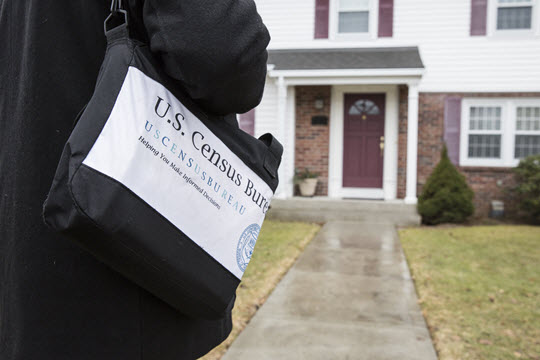
By CRISTINA JANNEY
Hays Post
You will be able to count yourself in the 2020 census in a new way — on the internet.
The U.S. Census Bureau will send invitations for your household to sign in online to complete your census form beginning March 9. Ninety-five percent of Americans will receive their invitations by mail, but 5 percent will have invitations dropped off at their homes. This is because the U.S. Census Bureau will not be sending census invitations to post office boxes.
You will be able to login to the website using computers, tablets and smartphones. You will also be able to complete the census by phone, by mail or in person with a census taker.
Steven Hale and other representatives of the U.S. Census Bureau in Kansas were in Hays Wednesday talking to the Western Kansas Rural Economic Development Alliance about the ramp up to the 2020 Census.
You may be seeing census employees in the community now who are verifying addresses prior to the census next year.
 The U.S. Census Bureau is also forming Complete Count Committees to help ensure accurate counts across the country. There is a state Complete Count Committee, but they can also be formed at the local level by local governments or civic groups. In some areas, librarians and even Girl Scout troops are leading the push to have their communities correctly counted.
The U.S. Census Bureau is also forming Complete Count Committees to help ensure accurate counts across the country. There is a state Complete Count Committee, but they can also be formed at the local level by local governments or civic groups. In some areas, librarians and even Girl Scout troops are leading the push to have their communities correctly counted.
The U.S. Census Bureau knows from past census audits communities with Complete Count Committees have more accurate counts.
Hale said people are more likely to listen to community members and trusted local officials.
In areas such as Liberal, where some census tracts are more than 80 percent Hispanic, U.S. Census Bureau is working with a local Complete Count Committee as well as Hispanic partnership specialists like Carlos Urquilla-Diaz to bridge culture divides.
“Let me help you be the bridge,” Urquilla-Diaz said. “I can initiate those conversations. It may be hard at first, but I can be a bridge and translate and create trust and understanding through those communities. After all this is over, we are still going to be dealing with their souls for 10 or more years. Whether you count them or not, whether you like them or not, they have a significant impact on the economics of and the political part of the state of Kansas.
“If you don’t get the money for the state of Kansas, that money will go somewhere else. The checks will be cut. How much is in that check every year depends on all of you.”
Group quarters counting will start in January. This includes college dorms, military barracks, senior living centers and prisons.
Hale said the modern census faces a number of challenges, including a mobile population, a diverse population, a distrust of government, complex living arrangements and rapidly changing use of technology.
The two hardest populations to count, Hale said, are children younger than 5 and adults older than 65.
The 10 questions on the census form will include:
- Name
- Phone number
- Age
- Sex
- Race
- Hispanic/non-Hispanic
- Relation to householder
- Household tenure (rent/own)
- Number of people in household
- Usual place of residence
All information that is taken will be kept confidential. Anyone releasing confidential census data is subject to up to a $250,000 fine and five years in jail. When data is released, it is only released in summary form. Census information is not shared with other government agencies.
Hale talked about why the census is important. The census is constitutionally mandated as a means to apportion U.S. House seats. Hale said Kansas is not expected to lose representation in the House as a result of this census, but that will not be determined until all of the numbers are in.
Perhaps a larger impact is money. Kansas receives $6 billion in federal funds annually. The census data is used to allocate funds for a bevy of government program. The top five are Medicaid, federal student loans, SNAP (food stamps) Medicare Part B and infrastructure projects.
“When you ask why should we care about listening to you guys about the U.S. census, the answer is very simple. It’s in front of you,” said Urquilla-Diaz, “All of these programs in front of you, and there are many more. If any of those programs affects you, your family or your friends, that is a reason why you should care. For example, when we undercount children, the needs of those children will be there period. K through 12 can be affected in a very negative way. The same thing with senior citizens.”
The 2020 count will affect funding through 2030.
“We have one shot to get it right in 10 years,” Hale said.
The U.S. Census Bureau will need to hire 4,500 people in Kansas, both part-time and full-time.
One audience member, asked where the census bureau was going to find these employees in a tight labor market. Emily Kelley, census coordinator, said anyone who is 18 or older, has a driver’s license and passes a federal background check can be a census employee. You can set your own hours and the number of hours you wish to work.
You can apply for a job with the U.S. Census Bureau at 2020census.gov/jobs for part-time workers and www.usajobs.gov for full-time workers. You can learn more about the census at www.census.gov.
“It is a great side hustle job,” Kelley said. “It is a great gig economy job. Instead of driving Uber, get out and walk and earn money that will help pay for your holiday shopping or the next family vacation.”
